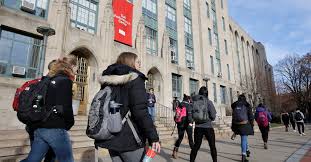By: David Leonhardt.
Their incomes are flat. Their wealth is down. And Washington is aggravating future threats.
For Americans under the age of 40, the 21st century has resembled one long recession.
I realize that may sound like an exaggeration, given that the economy has now been growing for almost a decade. But the truth is that younger Americans have not benefited much.
Look at incomes, for starters. People between the ages of 25 and 34 were earning slightly less in 2017 than people in that same age group had been in 2000:
Why is this happening? The main reason is a lack of economic dynamism. Not as many new companies have been forming since 2000 — for reasons that experts don’t totally understand — and existing companies have been expanding at a slower rate. (The pace of job cuts has also fallen, which is why the unemployment rate has stayed low.) Rather than starting new projects, companies are sitting on big piles of cash or distributing it to their shareholders.
This loss of dynamism hurts millennials and the younger Generation Z, even as baby boomers are often doing O.K. Because the layoff rate has declined since 2000, most older workers have been able to hold on to their jobs. For those who are retired, their income — through a combination of Social Security and 401(k)’s — still outpaces inflation on average.
But many younger workers are struggling to launch themselves into good-paying careers. They then lack the money to buy a first home or begin investing in the stock market. Yes, older workers face their own challenges, like age discrimination. Over all, though, the generational gap in both income and wealth is growing.
Given these trends, you’d think the government would be trying to help the young. But it’s not. If anything, federal and state policy is going in the other direction. Medicare and Social Security have been spared from cuts. Programs that benefit younger workers and families have not.
The biggest example is higher education. Over the past decade, states have cut college funding by an average of 16 percent per student. It’s a shocking form of economic myopia. In response, tuition has risen, and students have taken on more debt. Worst of all, many students attend colleges with high dropout rates and end up with debt but no degree.
And as badly as the government is treating the young today, the future looks even more ominous.
First, the national debt, while manageable now, is on pace to soar. The primary cause is the cost of health care: Most Americans receive far more in Medicare benefits than they paid in Medicare taxes. The Trump tax cut also plays a role. It is increasing the debt — and it mostly benefits older, affluent households.
Second, the warming planet is likely to cause terrible damage and bring huge costs.
Young Americans favor aggressive action, now, to slow climate change. But the Republican Party — which wins elections with strong support from older voters — has vetoed any such action. As a result, greenhouse gases keep spewing into the atmosphere, and the climate crisis is likely to be far worse than it needs to be. Today’s young Americans will be left to suffer the consequences and bear the costs.
Last week, one of those young Americans — somebody who qualifiesas an older millennial — announced that he was running for president: the 37-year-old mayor of South Bend, Ind., Pete Buttigieg. A Navy veteran and Rhodes scholar who’s been praised by Barack Obama, Buttigieg (“BOOT-edge-edge”) is a rising star in Democratic politics. But of course he is a long shot to win the nomination. He is the mayor of a moderate-size city, after all.
And yet I think his candidacy is important, because it has the potential to influence the entire campaign. Buttigieg kicked off his run by talking about “intergenerational justice” and made clear that he would focus sharply on the future. After we spoke on Friday, I looked at my notes and discovered he hadn’t said “Trump” once.
During our conversation, I asked him how he hoped to win over older Americans — who, to their credit, vote at much higher rates than the young — and he told me an intriguing story. When he first ran for mayor of South Bend in 2011, he had the money to conduct only one poll. In it, his team asked voters how they would feel about having such a young mayor. The group most likely to see it as an advantage were the oldest voters.
“Many of the people who respond most positively to a moral message about the future are older people,” he said. “The American story is one of making sure that each generation is better off than the last. I don’t want my generation to be the first not to enjoy that. But I also think older generations don’t want to be the ones to cause that.”
There are some unavoidable trade-offs between the young and the old: A dollar spent on Medicare is unavailable for universal pre-K. But the country’s biggest economic problems aren’t about hordes of greedy old people profiting off the young. They’re about an economy that showers much of its bounty on the already affluent, at the expense of most Americans — and of our future. The young pay the biggest price for these inequities.
That’s a vital subject for the 2020 campaign, whoever the leading candidates end up being.
Source of article: https://www.nytimes.com/2019/01/27/opinion/buttigieg-2020-millennials.html?rref=collection%2Ftimestopic%2FEducation&action=click&contentCollection=opinion®ion=stream&module=stream_unit&version=latest&contentPlacement=7&pgtype=collection







 Users Today : 95
Users Today : 95 Total Users : 35402644
Total Users : 35402644 Views Today : 115
Views Today : 115 Total views : 3331735
Total views : 3331735